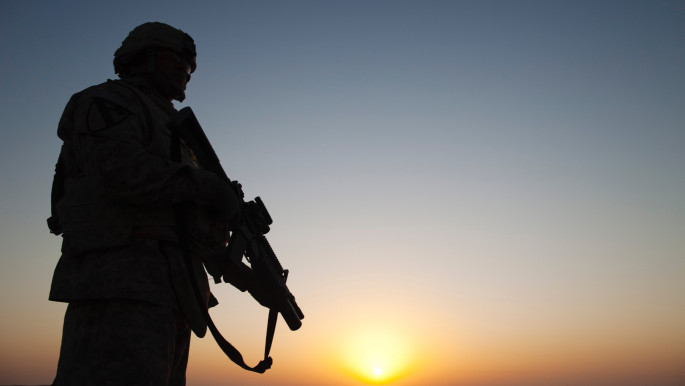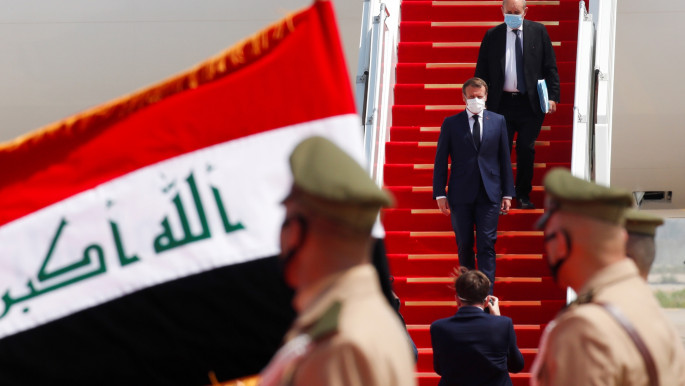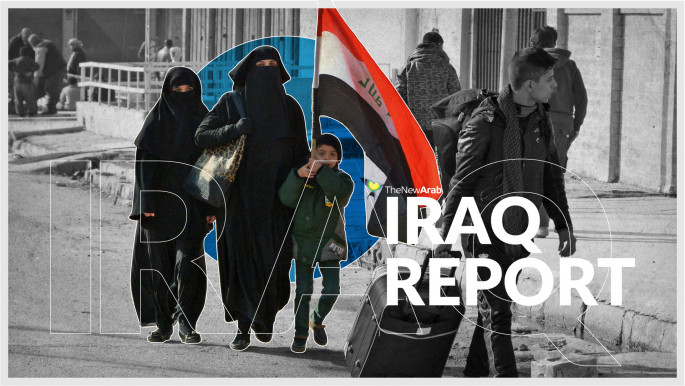The Iraq Report: US troop withdrawal raises the spectre of drone warfare
While pro-Iranian factions should ordinarily be happy with such an announcement by the United States, many have come to realise that a drawdown of American diplomacy and the withdrawal of its land forces could instead presage an enhanced military involvement using air assets and drones – something Iran's proxies cannot retaliate against.
While the federal authorities worry about what an American withdrawal may mean, the autonomous Kurdistan Regional Government (KRG) in Erbil is being once more criticised for silencing and suppressing journalists.
Activists, human rights organisations, and journalists have demanded the KRG release critics they say are being detained for criticising Erbil over corruption and a lack of paid salaries, setting the stage for more civil dissent in the Kurdish region of Iraq.
US threatens to end diplomacy if militia attacks continue
US Secretary of State Mike Pompeo threatened at the end of last month to shutter the American embassy in Baghdad if the Iraqi government did not stop attacks by pro-Iran Shia militants, raising the spectre that Washington may start opting to conduct diplomacy by drone strikes.
 |
Iraq has been scrambling to contain the diplomatic fallout of an angry Washington, which has threatened to shutter its embassy in Baghdad |  |
Seemingly reaching the limits of their patience, Pompeo stated that American diplomats could no longer be kept under the risk of Shia militant missile fire at the embassy in the heavily fortified but seemingly easily permeable Green Zone in Baghdad.
On the heels of Pompeo's announcement, and earlier in October, Prime Minister Mustafa al-Kadhimi confirmed that at least 2,500 US soldiers had been withdrawn from Iraq. While he feted this as a success of his diplomatic efforts to reduce the foreign military footprint in his country, Kadhimi's cabinet has been visibly rattled by Washington's threat to disengage from Iraq.
Foreign Minister Fuad Hussein openly stated that his country was "not happy" by the US' "dangerous" threats to abandon diplomacy in the country. Baghdad further announced it was taking security measures to ensure the American diplomatic mission remained engaged in Iraq.
 |
|
| Read more: The Iraq Report: US military drawdown will embolden Iran's proxies |
This is likely because a total American withdrawal would signal an abandonment of Kadhimi and his government and would indicate that Iran was now in total control of Iraqi affairs without any foreign power to balance against Tehran.
It would also lead to a broader drawdown of European and other diplomatic missions who rely on the United States as the senior partner in their relations with Iraq, indicating a lack of confidence in Iraq's ability to operate independently of Iran.
Between October 2019 and July this year in Iraq, around 40 rocket attacks have targeted the US embassy or bases housing US troops.
In the space of just two months, 40 attacks have taken place, targeting not only the embassy and military bases, but also the supply convoys of Iraqi contractors for Washington and its allies.
Recent attacks have mostly been claimed by little known factions among the array of Shia armed groups equipped and trained by neighbouring Iran during the war against the US, and later, the Islamic State group. Underlining the risks, a rocket attack targeting Baghdad International Airport hit a nearby home last month, killing five children and two women from the same family.
These escalations have led to reports that the United States has drawn up a list of 80 Shia militia targets across the length and breadth of Iraq, ready to launch drone attacks against them in a manner similar to how the Pentagon authorised the slaying in January of senior Iranian Islamic Revolutionary Guard Corps (IRGC) commander, Qassem Soleimani.
 |
Between October 2019 and July this year in Iraq, around 40 rocket attacks have targeted the US embassy or bases housing US troops |  |
The sites are said to include secret headquarters and shelters belonging to senior pro-Iran Iraqi figures such as the Badr Organisation's Hadi al-Amiri, who is also a former cabinet minister, and the leader of the powerful Asaib Ahl ul-Haq militia, Qais al-Khazali.
The US will also reportedly target Kataib Hezbollah, now led by US-designated terrorist Ahmad al-Hamidawi who replaced Abu Mahdi al-Muhandis, who was killed in the same strike that assassinated Soleimani.
While the alleged US drone target list has not been confirmed or denied by Washington, the threat has been linked to the withdrawal of the American diplomatic presence. It has also been treated with trepidation by Iranian proxies in Iraq who announced a ceasefire of "all factions of the [anti-US] resistance" if Baghdad successfully negotiates for a peaceful withdrawal of US forces from Iraq.
Evidently, the Trump administration's demonstration of American military might by killing Iran's most powerful and prominent general have made armed Tehran-backed Shia fundamentalists wary of pushing the White House too far for risk of being located and killed in a manner similar to how Soleimani's career ended.
 |
|
| Read more: The Iraq Report: France asserts itself as US withdraws |
It is further undoubtable that the Iraqi militants will be keenly observing the US elections and will prefer dealing with an administration led by Joe Biden rather than Donald Trump, as Biden was part of the former Obama administration which released $150 billion in frozen Iranian assets as part of the now endangered Iran nuclear deal that Trump abandoned.
Biden has also confirmed that he would commit the United States to rejoining the nuclear deal should he win the presidential elections in just a few weeks' time. This would undoubtedly provide relief to Iran which will then reduce its attacks by proxy on the American presence in Iraq, now widely considered Tehran's backyard.
Human rights slide in Kurdistan Region
Human rights and freedom of expression have come under attack by the Kurdistan Regional Government, as human rights groups have denounced the Erbil authorities' detention of journalists and activists.
Human rights groups have urged authorities in Iraqi Kurdistan to release a prominent journalist and an activist who had called for demonstrations over unpaid salaries of civil servants.
 |
US threats to shutter the American embassy in Baghdad have raised the spectre that Washington may start opting to conduct diplomacy by drone strikes |  |
Sherwan Sherwani, editor-in-chief of monthly magazine Bashur, was arrested at his home in Erbil earlier this month without a judicial warrant by "police officers, four of whom were in plainclothes", said the New York-based Committee to Protect Journalists.
"If the Kurdish regional government seeks to operate under the rule of law, they cannot make journalists disappear on a whim," the watchdog CPJ said in a statement Thursday.
Sherwani is known for hard-hitting investigations into corruption and embezzlement in the autonomous region of northern Iraq.
Local human rights groups also raised concern over Badal Barwari, a schoolteacher and political organiser, who was detained in August by Kurdish security forces. Barwari had called for protests in the town of Dohuk near the border with Turkey demanding payment of civil servant salaries.
 |
|
| Read more: The Iraq Report: Iraq still in chaos 17 years after US invasion |
He was due to be released on 4 October but remains in custody and his family have not seen him.
Since January, the KRG has paid only six months' worth of salaries to its 1.2 million civil servants. In June, it slashed salaries of public sector employees by over 20 percent for those earning more than $250 a month.
Rallies in Dohuk and Erbil, the capital of cash-strapped Iraqi Kurdistan whose government is led by the Kurdistan Democratic Party (KDP), are regularly dispersed.
Dhiya Butros, head of Kurdistan's Human Rights Commission, told local media last month that since late August 305 people have been arrested, with 19 still detained.
Kurdistan-based METRO Center for Journalists Rights and Advocacy recorded 88 violations against 62 journalists and media outlets in the first six months of 2020.
Human Rights Watch (HRW) has accused Kurdish authorities of "unlawfully" closing two offices of a private television channel, "apparently for covering protests and for broadcasts critical" of the KDP.
Although Iraqi Kurdistan presents itself as a haven for Iraqi dissidents and foreign investors, it is often singled out by rights groups over freedom of expression issues and for curtailing human rights. This is particularly the case whenever the KRG are criticised for their record on governance, leading to accusations of silencing critics.
With the financial situation unlikely to remedy itself in the near future, it appears inevitable that unpaid employees of the KRG civil service, the largest employer in the region, will continue to clash with the authorities. How the KRG handles this will internationally impact upon its ability to portray itself as a bastion for democracy and human rights as it likes to portray itself as being.
The Iraq Report is a regular feature at The New Arab.
Click below to see the full archive:
 |
|





 Follow the Middle East's top stories in English at The New Arab on Google News
Follow the Middle East's top stories in English at The New Arab on Google News


